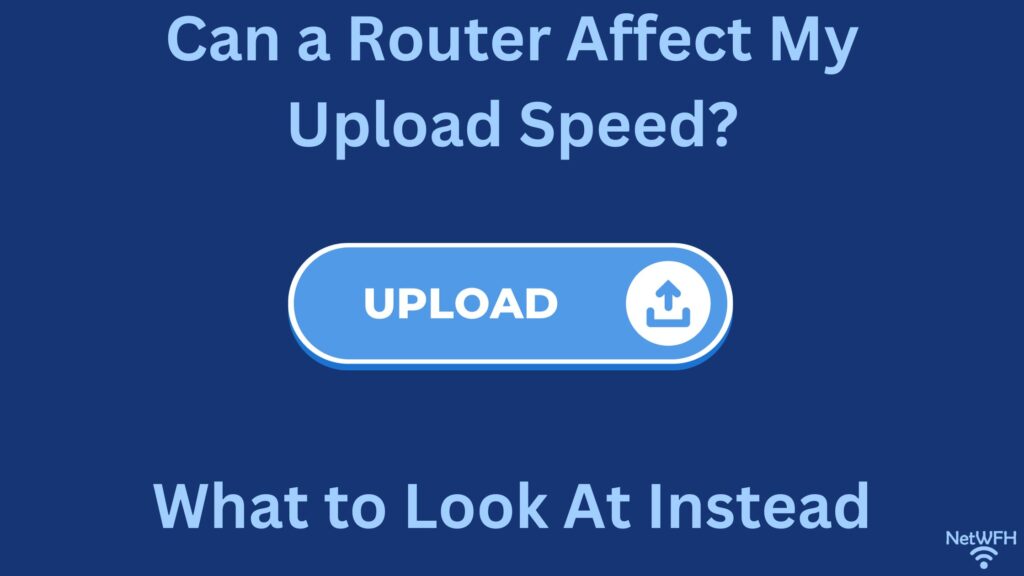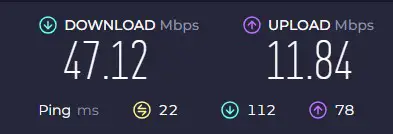This post contains affiliate links.

In recent years, upload speed has become a more important part of internet plans.
More than ever before, people are connecting to the internet to:
- Participate in video conferences
- Upload documents to a shared location when working from home
- Upload videos to YouTube
- Stream live gaming sessions
The common requirement of all of these activities is the need for upload speed. An increased frequency of these activities has led to more analysis of a network’s upload speed than ever before.
When poor upload performance is experienced, the first device people blame is their router.
So the question is, does your router affect the upload speed of your home network?
In most cases, a router will have no impact on the upload speed of an internet plan. Most routers can support internet speeds much faster than the maximum upload speed provided by an internet plan. As a result, the router is almost never the reason for poor upload performance.
In this post, I’ll discuss why your router shouldn’t impact the upload speed of your internet plan. I’ll also talk about the main factor that determines the upload speed of your network.
Will Your Router Impact the Upload Speed of Your Network?
To put it simply, you shouldn’t be looking at your router as the reason why you have a low upload speed.
The reason you have low upload speed in your home network is because of your internet plan. Your internet provider likely provides a low upload speed when compared to the download speed it supports as part of your internet plan. This is by design due to the nature of how people use the internet in their homes.
Why Your Router Does Not Affect Your Upload Speed
Routers are designed to support the heavy download requirements of a given home network. This is why you’ll see routers that can support internet speeds of 600 megabits per second (Mbps) or faster.
As an aside, if you’re curious about finding out the speed your router can support, check out the article I wrote that details what you need to do to find out.
So let’s say you have an internet plan that provides up to 600 Mbps of download speed. An internet plan with that kind of download speed probably supports a maximum upload speed of about 10 Mbps.
For an example of the major difference between upload and download speeds provided by an internet plan, look no further than my internet.
I ran a speed test on my home network and these are the results I got:

As you can see, the download speed of my home network is much faster than the upload speed of my network.
Keep this difference in mind when thinking about what your router is designed to do. Your router is designed to support the fastest speed of data through your network, regardless of the direction the data is going in (to or from the internet provider).
If a router can’t support the maximum speed of a given internet plan, it’ll serve as a bottleneck and slow down the entire network.
So if a router can support the maximum download speed of an internet plan, it won’t have any problem supporting the upload speed of the plan. This is why routers are designed to support the maximum download speed of an internet plan.
This is also why your router won’t have any impact on the upload speed of your network.
In my case, my router would have to support a maximum internet speed of less than 10 Mbps in order for it to affect my upload speed.
They don’t even make routers that supports speeds that slow anymore. Not to mention, I wouldn’t be able to do much on the internet if my router supported download speeds of less than 10 Mbps.
So if your router won’t affect the upload speed of your network, what will?
What Impacts the Upload Speed of a Network?
When it comes to your network’s upload speed, there’s really only one variable that matters.
I’m talking about your internet plan.
As I previously mentioned, you don’t have to worry about your router’s limitations reducing your upload speed. This means that your router will support just about any upload speed that your internet provider can handle.
All the other variables that may impact the download speed of your internet plan won’t come into play with your upload speed because of how slow upload speeds are in comparison.
Namely, I’m referring to your modem and ethernet cables here. It’s possible that these things can limit your download speed if they aren’t sized properly. The fact of the matter is, even the slowest modem and ethernet cable can support upload speeds of 10 Mbps. You’re much more likely to see your modem or ethernet cables limit the download speed of your internet plan than your upload speed.
So if you’re looking to increase the upload speed of your network, you need to look at your internet plan.
How Do I Improve the Upload Speed of My Network?
If you’re currently unsatisfied with the upload speed of your network, your only choice is to look at upgrading your internet plan.
Unfortunately, your options might be limited here.
You may have to pay significantly more for a marginal increase in upload speed (10-20 Mbps). Simply put, internet providers don’t support fast upload speeds as part of their traditional internet plans. You will likely find this to be the case with the most common types of internet plans like cable and DSL internet plans.
With that said, if you have a need for blazing upload speeds, you might have another option.
You might be able to upgrade to a fiber internet plan.
Fiber internet plans are different from cable and DSL internet plans because they support upload speeds that are equal to the download speeds of the plan.
In other words, if your fiber internet plan supports 1 gigabit per second (1,000 Mbps) of download speed, it’ll support 1 gigabit per second of upload speed. This is due to how fiber optic internet cables transfer data when compared to DSL and cable internet plans.
That’s a topic for another day.
Before you get too excited, you should know that fiber internet plans aren’t available to everyone. Although the availability of fiber internet plans is improving, the Fiber Broadband Association (FBA) indicated that 43% of the United States has access to fiber internet in 2022.
Even if fiber is available in your area, in many cases it doesn’t come cheaply. Chances are, you’ll have to pay more than your current DSL or cable internet plan if you want to upgrade to fiber.
With limited other choices for improving the upload speed of your network, you might find it worth the price.
Wrap Up
You don’t have to worry about your router limiting the upload speed of your network.
If you’d like to improve your network’s upload speed, the only variable you need to look at is your internet plan. You’ll need to increase the maximum upload speed of your internet plan if you want better upload performance.
If you have any questions about the information I presented in this post, please leave a comment below.
If you’re interested in learning more about similar topics, check out these other articles I’ve previously written:
What Speed Can My Router Handle? What You Need to Look At
Do Cable Modems Work With Fiber? The Device You Really Need
Will a New Router Increase Internet Speed? An Explanation
